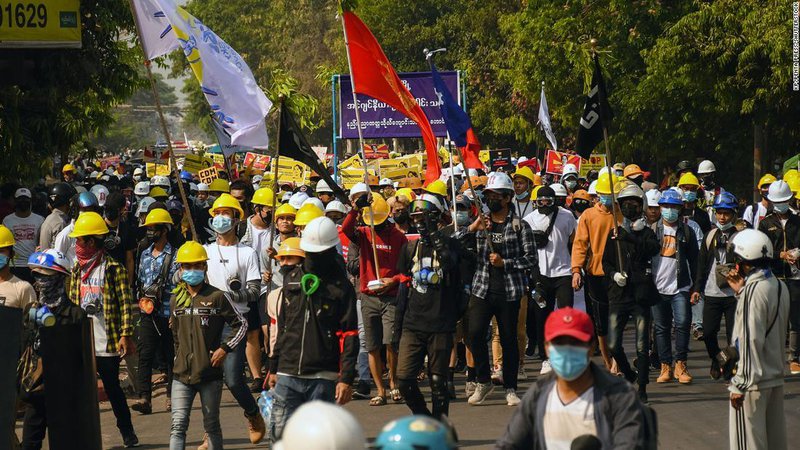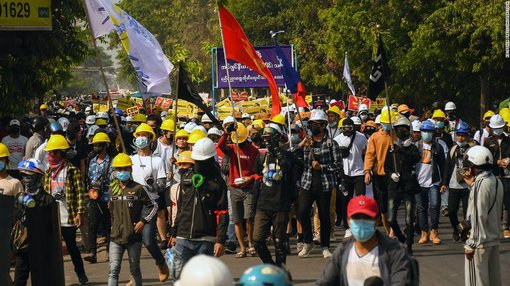Thousands of Academics Suspended After Protesting Against Military Rule in Myanmar
Myanmar Asia Higher Education News by Erudera News May 11, 2021

Over 11,000 professors and university staff members have been suspended from their jobs after joining the protest against military rule after the February 1 coup that occurred in Myanmar.
The suspensions came as a result of the military and students’ clash after the latter has been calling to boycott universities due to the February coup when the junta, a military group, took the country’s authority power, Erudera.com reports.
Academics Refuse to Work “Following Military Council Orders”
A professor who goes by the name of Thandar said that she was upset to leave the job she loves so much but claimed to be proud to stand against injustice.
“My department summoned me today. I’m not going. We shouldn’t follow the orders of the military council,” the 37-year-old university lecturer said.
Furthermore, a professor in a fellowship in America was asked to declare she was against the protests or lose her job.
According to a Myanmar Teacher’s Federation official, approximately 11,100 academics and other staff have been suspended from colleges and universities.
The most recent data published by the World Bank shows that Myanmar had more than 26,000 teachers in universities and colleges in 2018.
Academics have been among the first to object to the junta administration, which started in 1962 and ended in 2011 to return in 2021.
On the other hand, the junta’s security forces have settled campuses in Yangon, the biggest city in Myanmar. Global New Light of Myanmar, a newspaper controlled by the military rule, said that academics should cooperate so the education system can be resumed to pre-Coronavirus operations.
“Political opportunists do not wish to see such development by committing sabotage acts,” the 57-year-old newspaper who operated during the previous military rule said.
Students Boycott Schools & Universities – Say They’ll Return “When The Revolution Prevails”
Many students are boycotting classes, and they “don’t feel sad to miss school,” as Hnin, a 22-year-old student at the Yangon University of Education, claimed.
“There’s nothing to lose from missing the junta’s education,” he said.
Last week, a group of protesters at the school entrance in Mawlamyine shouted, “we don’t want to be educated in military slavery,” which has become a known phrase at students’ demonstrations across the country.
According to the Assistance Association for Political Prisoners activist group, many of at least 780 people killed by the military are students. Approximately 3,800 are suffering detention, of which 48 are teachers, 150 of which have received arrest warrants.
Zaw Wai Soe, the education minister, announced by the National Unity Government claimed he was touched that students would only return “when the revolution prevails.”
It is uncertain even for younger students to return to schools due to the chaotic situation in Myanmar since, in typical circumstances, schools would now start taking students’ registration applications for the new academic year. There are nearly ten million students in the country of 53 million people.
Myanmar’s education system was weak, to begin with, being ranked 92 out of 93 countries in a global survey in 2020.
According to World Bank figures, Myanmar’s education is one of the lowest-rated in the world. Even during Aung San Suu Kyi’s rule, who was the former prime minister of Myanmar and the Nobel Prize winner for conflict solving in her home country, the education investment rate was below two percent of the entire gross domestic product.
“When it comes to education, I would suggest that instead of thinking about getting a bachelor’s degree, you must go to the University of Life with a major in revolution. You can go for a Masters or PhD later,” Saw Kapi, a founding director of the Salween Institute for Public Policy think tank, said.
On February 5, teachers and other government workers joined the movement against the junta, refusing to work for military authorities until the elected government is restored. The next day, the military rule blocked the social media, where protesters arranged their activities, and later on, the country’s entire internet was shut down.
As a result of protests, the Asian Institute of Technology (AUT) has restricted international students from Myanmar political rallies, risking visa revocation and potential immigration blacklisting.
According to an email directed to students, ATI respects freedom of speech, and it is only voicing the Thai immigration’s request for international students to not participate in protests.
“All of us must be respectful of the laws and policies of the host country Thailand. We strongly urge members of the AIT community to take heed of the message issued by the government of Thailand,” AIT wrote.
A large community of Myanmar lives in Thailand, where last month, protesters gathered in front of the Myanmar embassy and United Nations headquarters in Bangkok, demanding for the institutions to take action immediately.
Recent Articles
France
May 03, 2024
United States
May 02, 2024
United States
Apr 30, 2024
Bulgaria
Apr 30, 2024
